Analysis of Australian Taxation Laws for Bitcoin and Crypto
VerifiedAdded on 2020/01/28
|9
|2424
|81
Report
AI Summary
This report provides a comprehensive overview of Australian taxation laws, including income tax, capital gains tax (CGT), Goods and Services Tax (GST), and fringe benefit tax (FBT), with a particular focus on their application to digital currencies, such as Bitcoin. It examines how the Australian Tax Office (ATO) treats cryptocurrencies, classifying them as assets rather than currency, and details the tax implications for individuals and businesses involved in Bitcoin transactions. The report explains the principles of taxation in relation to digital currencies, including record-keeping requirements, capital gains tax on disposal, and GST implications for merchants. It also addresses fringe benefits tax consequences for businesses using Bitcoin for employee compensation. Furthermore, it discusses the government's approach to double taxation and its efforts to ensure that consumers are not doubly taxed when using digital currencies. The report concludes by emphasizing the importance of understanding these tax regulations to ensure compliance and highlights the evolving nature of taxation in the digital currency landscape.
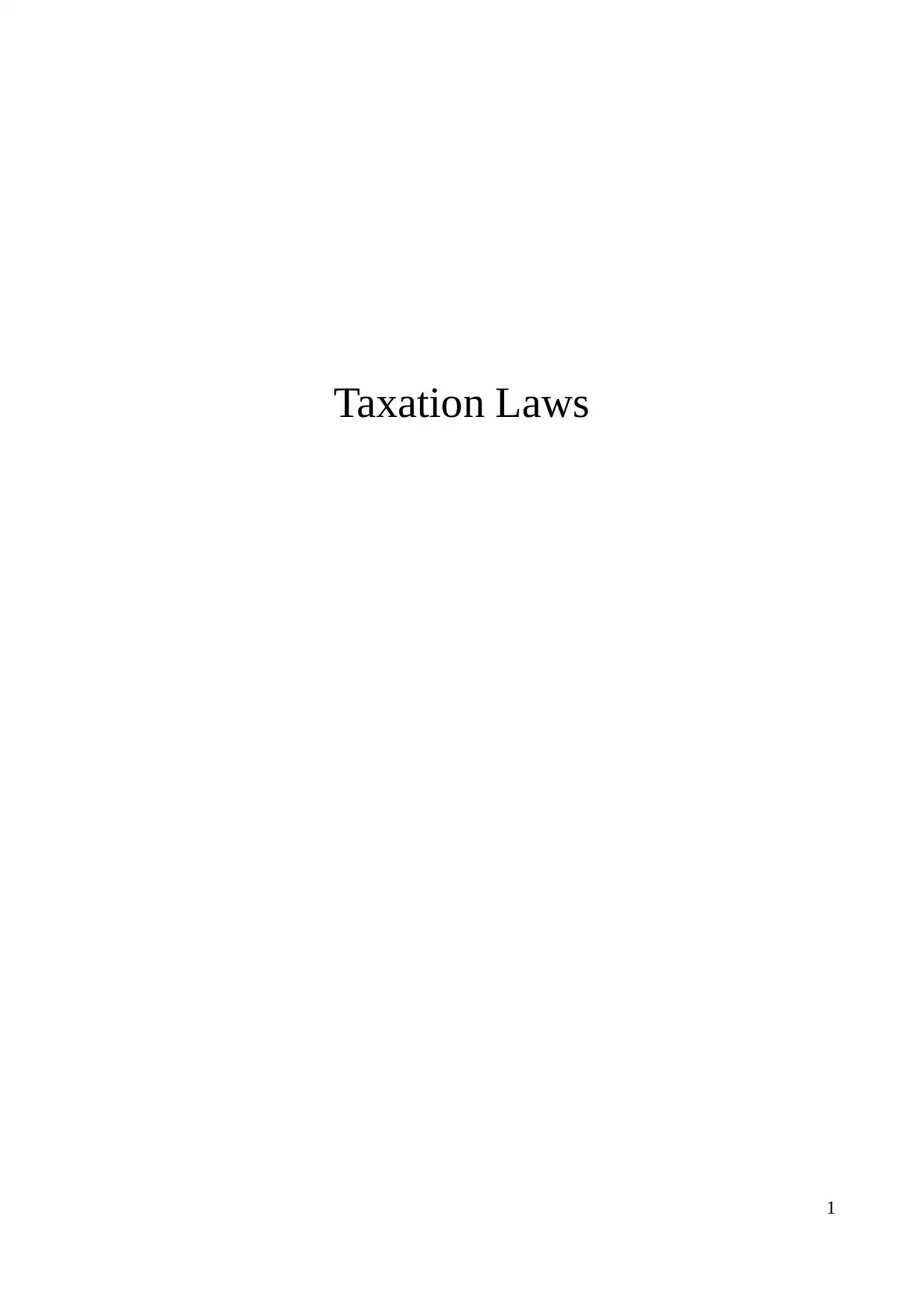
Taxation Laws
1
1
Paraphrase This Document
Need a fresh take? Get an instant paraphrase of this document with our AI Paraphraser

Table of Contents
INTRODUCTION................................................................................................................................4
What are digital currencies such as Bitcoins in Australia................................................................4
Tax implications On bitcoins and other crypto currencies...............................................................4
Principle of Taxation laws in respect to Income tax, capital gain tax, GST and fringe benefit tax.6
CONCLUSION....................................................................................................................................7
References............................................................................................................................................8
2
INTRODUCTION................................................................................................................................4
What are digital currencies such as Bitcoins in Australia................................................................4
Tax implications On bitcoins and other crypto currencies...............................................................4
Principle of Taxation laws in respect to Income tax, capital gain tax, GST and fringe benefit tax.6
CONCLUSION....................................................................................................................................7
References............................................................................................................................................8
2

3
Feedback : tomorrow
you didn't answer all the requirement
In your answer, you should list relevant ATO
Rulings/Determinations and discuss their application you
haven't put in the assignment
Feedback : tomorrow
you didn't answer all the requirement
In your answer, you should list relevant ATO
Rulings/Determinations and discuss their application you
haven't put in the assignment
⊘ This is a preview!⊘
Do you want full access?
Subscribe today to unlock all pages.

Trusted by 1+ million students worldwide
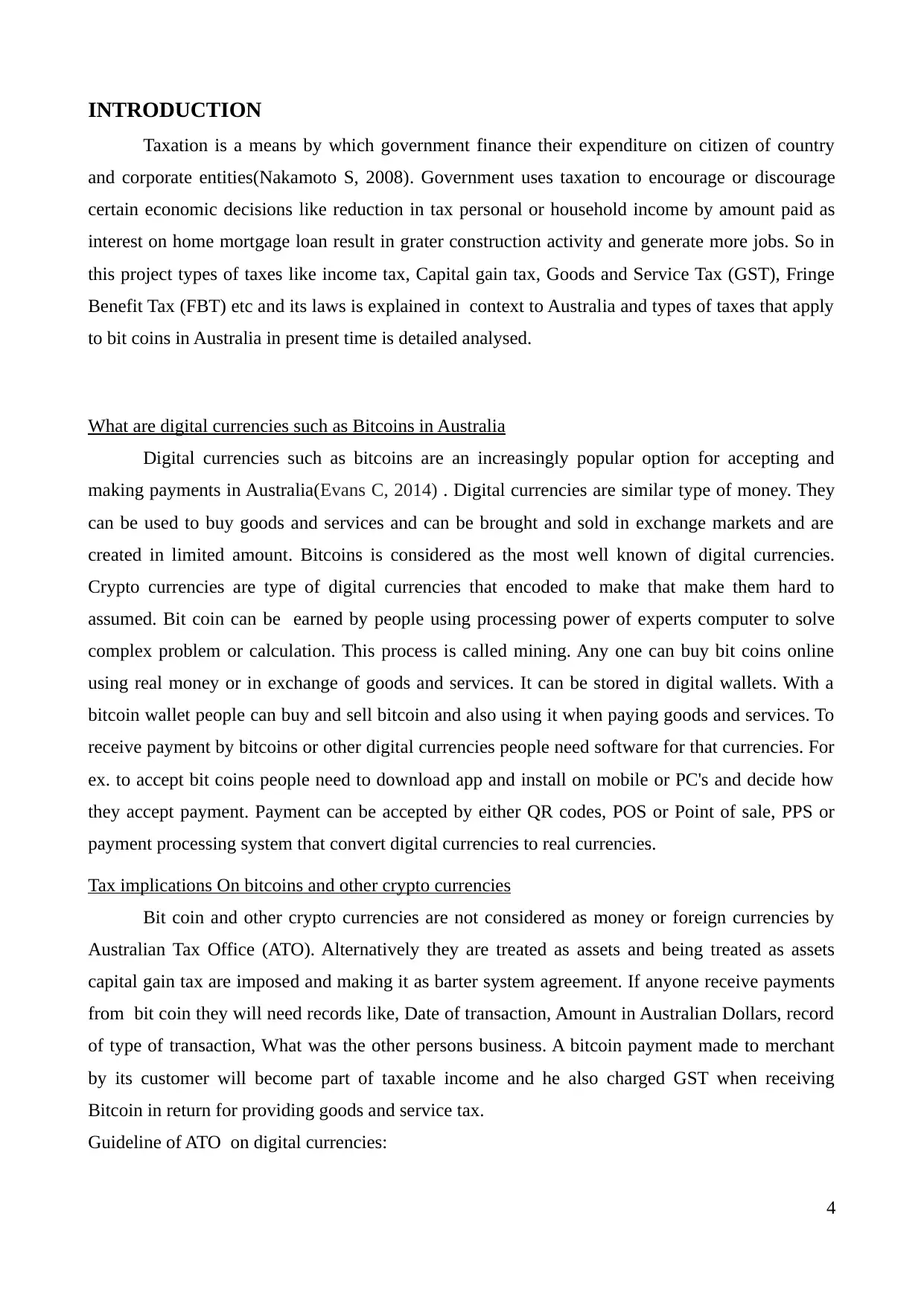
INTRODUCTION
Taxation is a means by which government finance their expenditure on citizen of country
and corporate entities(Nakamoto S, 2008). Government uses taxation to encourage or discourage
certain economic decisions like reduction in tax personal or household income by amount paid as
interest on home mortgage loan result in grater construction activity and generate more jobs. So in
this project types of taxes like income tax, Capital gain tax, Goods and Service Tax (GST), Fringe
Benefit Tax (FBT) etc and its laws is explained in context to Australia and types of taxes that apply
to bit coins in Australia in present time is detailed analysed.
What are digital currencies such as Bitcoins in Australia
Digital currencies such as bitcoins are an increasingly popular option for accepting and
making payments in Australia(Evans C, 2014) . Digital currencies are similar type of money. They
can be used to buy goods and services and can be brought and sold in exchange markets and are
created in limited amount. Bitcoins is considered as the most well known of digital currencies.
Crypto currencies are type of digital currencies that encoded to make that make them hard to
assumed. Bit coin can be earned by people using processing power of experts computer to solve
complex problem or calculation. This process is called mining. Any one can buy bit coins online
using real money or in exchange of goods and services. It can be stored in digital wallets. With a
bitcoin wallet people can buy and sell bitcoin and also using it when paying goods and services. To
receive payment by bitcoins or other digital currencies people need software for that currencies. For
ex. to accept bit coins people need to download app and install on mobile or PC's and decide how
they accept payment. Payment can be accepted by either QR codes, POS or Point of sale, PPS or
payment processing system that convert digital currencies to real currencies.
Tax implications On bitcoins and other crypto currencies
Bit coin and other crypto currencies are not considered as money or foreign currencies by
Australian Tax Office (ATO). Alternatively they are treated as assets and being treated as assets
capital gain tax are imposed and making it as barter system agreement. If anyone receive payments
from bit coin they will need records like, Date of transaction, Amount in Australian Dollars, record
of type of transaction, What was the other persons business. A bitcoin payment made to merchant
by its customer will become part of taxable income and he also charged GST when receiving
Bitcoin in return for providing goods and service tax.
Guideline of ATO on digital currencies:
4
Taxation is a means by which government finance their expenditure on citizen of country
and corporate entities(Nakamoto S, 2008). Government uses taxation to encourage or discourage
certain economic decisions like reduction in tax personal or household income by amount paid as
interest on home mortgage loan result in grater construction activity and generate more jobs. So in
this project types of taxes like income tax, Capital gain tax, Goods and Service Tax (GST), Fringe
Benefit Tax (FBT) etc and its laws is explained in context to Australia and types of taxes that apply
to bit coins in Australia in present time is detailed analysed.
What are digital currencies such as Bitcoins in Australia
Digital currencies such as bitcoins are an increasingly popular option for accepting and
making payments in Australia(Evans C, 2014) . Digital currencies are similar type of money. They
can be used to buy goods and services and can be brought and sold in exchange markets and are
created in limited amount. Bitcoins is considered as the most well known of digital currencies.
Crypto currencies are type of digital currencies that encoded to make that make them hard to
assumed. Bit coin can be earned by people using processing power of experts computer to solve
complex problem or calculation. This process is called mining. Any one can buy bit coins online
using real money or in exchange of goods and services. It can be stored in digital wallets. With a
bitcoin wallet people can buy and sell bitcoin and also using it when paying goods and services. To
receive payment by bitcoins or other digital currencies people need software for that currencies. For
ex. to accept bit coins people need to download app and install on mobile or PC's and decide how
they accept payment. Payment can be accepted by either QR codes, POS or Point of sale, PPS or
payment processing system that convert digital currencies to real currencies.
Tax implications On bitcoins and other crypto currencies
Bit coin and other crypto currencies are not considered as money or foreign currencies by
Australian Tax Office (ATO). Alternatively they are treated as assets and being treated as assets
capital gain tax are imposed and making it as barter system agreement. If anyone receive payments
from bit coin they will need records like, Date of transaction, Amount in Australian Dollars, record
of type of transaction, What was the other persons business. A bitcoin payment made to merchant
by its customer will become part of taxable income and he also charged GST when receiving
Bitcoin in return for providing goods and service tax.
Guideline of ATO on digital currencies:
4
Paraphrase This Document
Need a fresh take? Get an instant paraphrase of this document with our AI Paraphraser
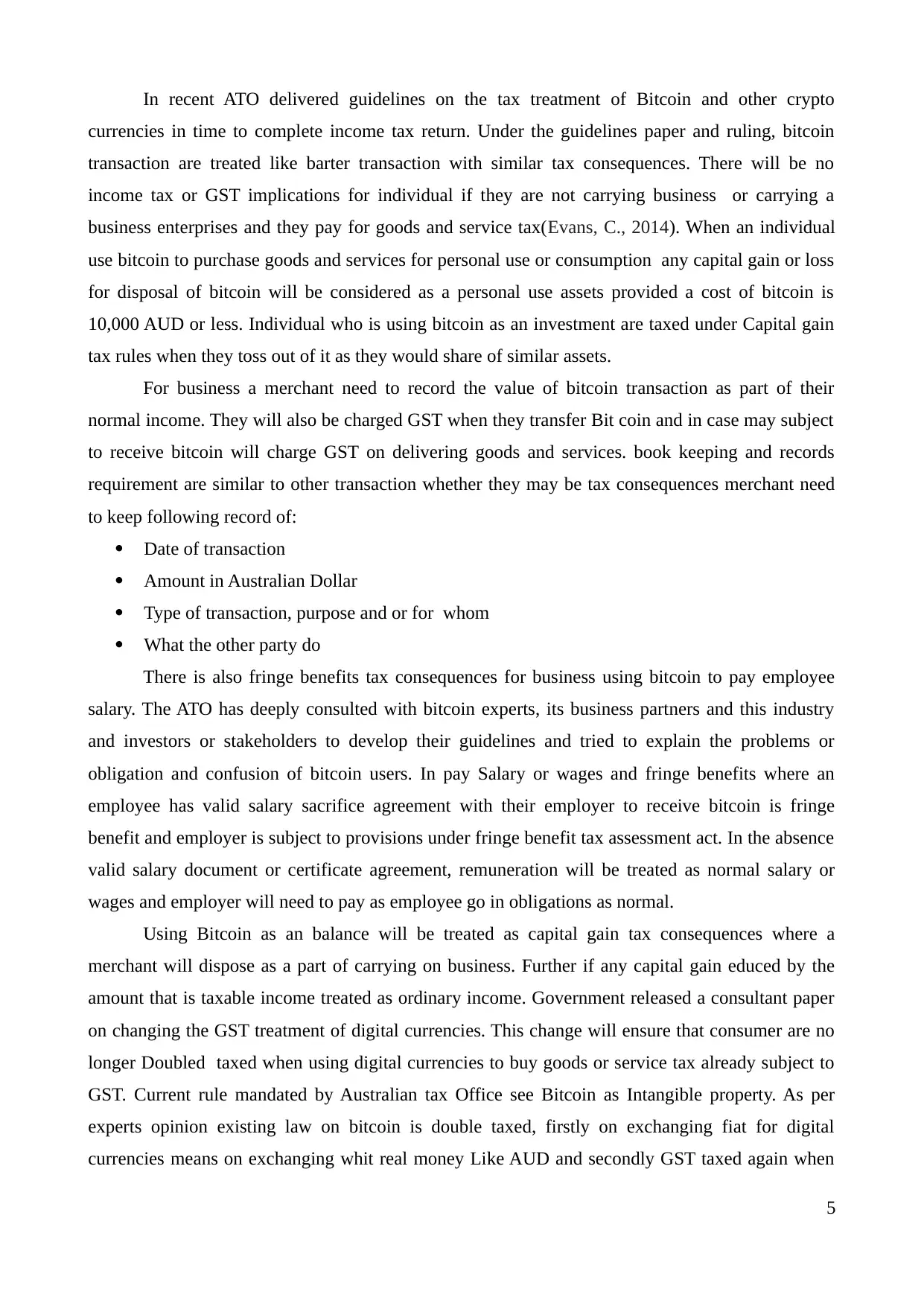
In recent ATO delivered guidelines on the tax treatment of Bitcoin and other crypto
currencies in time to complete income tax return. Under the guidelines paper and ruling, bitcoin
transaction are treated like barter transaction with similar tax consequences. There will be no
income tax or GST implications for individual if they are not carrying business or carrying a
business enterprises and they pay for goods and service tax(Evans, C., 2014). When an individual
use bitcoin to purchase goods and services for personal use or consumption any capital gain or loss
for disposal of bitcoin will be considered as a personal use assets provided a cost of bitcoin is
10,000 AUD or less. Individual who is using bitcoin as an investment are taxed under Capital gain
tax rules when they toss out of it as they would share of similar assets.
For business a merchant need to record the value of bitcoin transaction as part of their
normal income. They will also be charged GST when they transfer Bit coin and in case may subject
to receive bitcoin will charge GST on delivering goods and services. book keeping and records
requirement are similar to other transaction whether they may be tax consequences merchant need
to keep following record of:
Date of transaction
Amount in Australian Dollar
Type of transaction, purpose and or for whom
What the other party do
There is also fringe benefits tax consequences for business using bitcoin to pay employee
salary. The ATO has deeply consulted with bitcoin experts, its business partners and this industry
and investors or stakeholders to develop their guidelines and tried to explain the problems or
obligation and confusion of bitcoin users. In pay Salary or wages and fringe benefits where an
employee has valid salary sacrifice agreement with their employer to receive bitcoin is fringe
benefit and employer is subject to provisions under fringe benefit tax assessment act. In the absence
valid salary document or certificate agreement, remuneration will be treated as normal salary or
wages and employer will need to pay as employee go in obligations as normal.
Using Bitcoin as an balance will be treated as capital gain tax consequences where a
merchant will dispose as a part of carrying on business. Further if any capital gain educed by the
amount that is taxable income treated as ordinary income. Government released a consultant paper
on changing the GST treatment of digital currencies. This change will ensure that consumer are no
longer Doubled taxed when using digital currencies to buy goods or service tax already subject to
GST. Current rule mandated by Australian tax Office see Bitcoin as Intangible property. As per
experts opinion existing law on bitcoin is double taxed, firstly on exchanging fiat for digital
currencies means on exchanging whit real money Like AUD and secondly GST taxed again when
5
currencies in time to complete income tax return. Under the guidelines paper and ruling, bitcoin
transaction are treated like barter transaction with similar tax consequences. There will be no
income tax or GST implications for individual if they are not carrying business or carrying a
business enterprises and they pay for goods and service tax(Evans, C., 2014). When an individual
use bitcoin to purchase goods and services for personal use or consumption any capital gain or loss
for disposal of bitcoin will be considered as a personal use assets provided a cost of bitcoin is
10,000 AUD or less. Individual who is using bitcoin as an investment are taxed under Capital gain
tax rules when they toss out of it as they would share of similar assets.
For business a merchant need to record the value of bitcoin transaction as part of their
normal income. They will also be charged GST when they transfer Bit coin and in case may subject
to receive bitcoin will charge GST on delivering goods and services. book keeping and records
requirement are similar to other transaction whether they may be tax consequences merchant need
to keep following record of:
Date of transaction
Amount in Australian Dollar
Type of transaction, purpose and or for whom
What the other party do
There is also fringe benefits tax consequences for business using bitcoin to pay employee
salary. The ATO has deeply consulted with bitcoin experts, its business partners and this industry
and investors or stakeholders to develop their guidelines and tried to explain the problems or
obligation and confusion of bitcoin users. In pay Salary or wages and fringe benefits where an
employee has valid salary sacrifice agreement with their employer to receive bitcoin is fringe
benefit and employer is subject to provisions under fringe benefit tax assessment act. In the absence
valid salary document or certificate agreement, remuneration will be treated as normal salary or
wages and employer will need to pay as employee go in obligations as normal.
Using Bitcoin as an balance will be treated as capital gain tax consequences where a
merchant will dispose as a part of carrying on business. Further if any capital gain educed by the
amount that is taxable income treated as ordinary income. Government released a consultant paper
on changing the GST treatment of digital currencies. This change will ensure that consumer are no
longer Doubled taxed when using digital currencies to buy goods or service tax already subject to
GST. Current rule mandated by Australian tax Office see Bitcoin as Intangible property. As per
experts opinion existing law on bitcoin is double taxed, firstly on exchanging fiat for digital
currencies means on exchanging whit real money Like AUD and secondly GST taxed again when
5
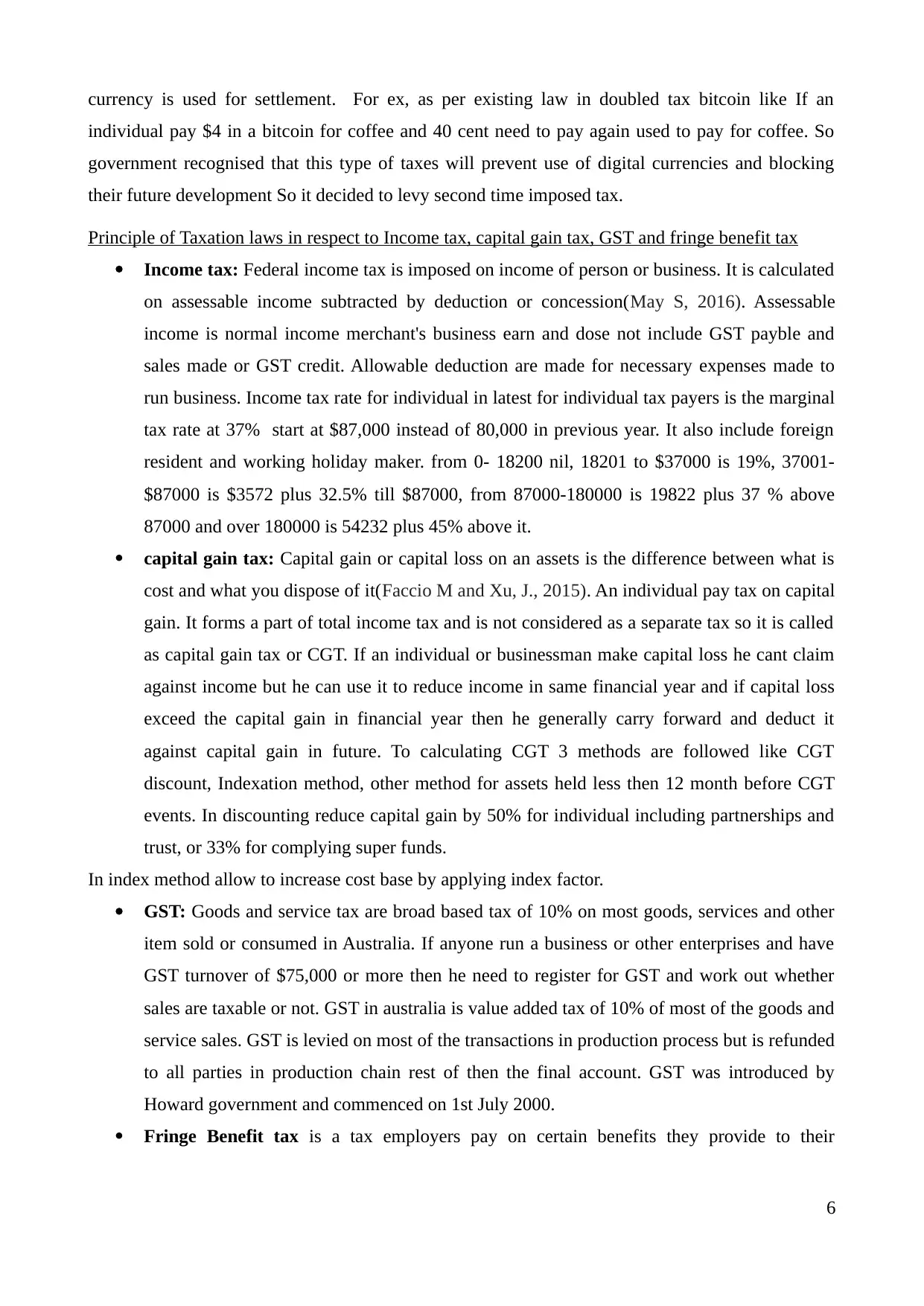
currency is used for settlement. For ex, as per existing law in doubled tax bitcoin like If an
individual pay $4 in a bitcoin for coffee and 40 cent need to pay again used to pay for coffee. So
government recognised that this type of taxes will prevent use of digital currencies and blocking
their future development So it decided to levy second time imposed tax.
Principle of Taxation laws in respect to Income tax, capital gain tax, GST and fringe benefit tax
Income tax: Federal income tax is imposed on income of person or business. It is calculated
on assessable income subtracted by deduction or concession(May S, 2016). Assessable
income is normal income merchant's business earn and dose not include GST payble and
sales made or GST credit. Allowable deduction are made for necessary expenses made to
run business. Income tax rate for individual in latest for individual tax payers is the marginal
tax rate at 37% start at $87,000 instead of 80,000 in previous year. It also include foreign
resident and working holiday maker. from 0- 18200 nil, 18201 to $37000 is 19%, 37001-
$87000 is $3572 plus 32.5% till $87000, from 87000-180000 is 19822 plus 37 % above
87000 and over 180000 is 54232 plus 45% above it.
capital gain tax: Capital gain or capital loss on an assets is the difference between what is
cost and what you dispose of it(Faccio M and Xu, J., 2015). An individual pay tax on capital
gain. It forms a part of total income tax and is not considered as a separate tax so it is called
as capital gain tax or CGT. If an individual or businessman make capital loss he cant claim
against income but he can use it to reduce income in same financial year and if capital loss
exceed the capital gain in financial year then he generally carry forward and deduct it
against capital gain in future. To calculating CGT 3 methods are followed like CGT
discount, Indexation method, other method for assets held less then 12 month before CGT
events. In discounting reduce capital gain by 50% for individual including partnerships and
trust, or 33% for complying super funds.
In index method allow to increase cost base by applying index factor.
GST: Goods and service tax are broad based tax of 10% on most goods, services and other
item sold or consumed in Australia. If anyone run a business or other enterprises and have
GST turnover of $75,000 or more then he need to register for GST and work out whether
sales are taxable or not. GST in australia is value added tax of 10% of most of the goods and
service sales. GST is levied on most of the transactions in production process but is refunded
to all parties in production chain rest of then the final account. GST was introduced by
Howard government and commenced on 1st July 2000.
Fringe Benefit tax is a tax employers pay on certain benefits they provide to their
6
individual pay $4 in a bitcoin for coffee and 40 cent need to pay again used to pay for coffee. So
government recognised that this type of taxes will prevent use of digital currencies and blocking
their future development So it decided to levy second time imposed tax.
Principle of Taxation laws in respect to Income tax, capital gain tax, GST and fringe benefit tax
Income tax: Federal income tax is imposed on income of person or business. It is calculated
on assessable income subtracted by deduction or concession(May S, 2016). Assessable
income is normal income merchant's business earn and dose not include GST payble and
sales made or GST credit. Allowable deduction are made for necessary expenses made to
run business. Income tax rate for individual in latest for individual tax payers is the marginal
tax rate at 37% start at $87,000 instead of 80,000 in previous year. It also include foreign
resident and working holiday maker. from 0- 18200 nil, 18201 to $37000 is 19%, 37001-
$87000 is $3572 plus 32.5% till $87000, from 87000-180000 is 19822 plus 37 % above
87000 and over 180000 is 54232 plus 45% above it.
capital gain tax: Capital gain or capital loss on an assets is the difference between what is
cost and what you dispose of it(Faccio M and Xu, J., 2015). An individual pay tax on capital
gain. It forms a part of total income tax and is not considered as a separate tax so it is called
as capital gain tax or CGT. If an individual or businessman make capital loss he cant claim
against income but he can use it to reduce income in same financial year and if capital loss
exceed the capital gain in financial year then he generally carry forward and deduct it
against capital gain in future. To calculating CGT 3 methods are followed like CGT
discount, Indexation method, other method for assets held less then 12 month before CGT
events. In discounting reduce capital gain by 50% for individual including partnerships and
trust, or 33% for complying super funds.
In index method allow to increase cost base by applying index factor.
GST: Goods and service tax are broad based tax of 10% on most goods, services and other
item sold or consumed in Australia. If anyone run a business or other enterprises and have
GST turnover of $75,000 or more then he need to register for GST and work out whether
sales are taxable or not. GST in australia is value added tax of 10% of most of the goods and
service sales. GST is levied on most of the transactions in production process but is refunded
to all parties in production chain rest of then the final account. GST was introduced by
Howard government and commenced on 1st July 2000.
Fringe Benefit tax is a tax employers pay on certain benefits they provide to their
6
⊘ This is a preview!⊘
Do you want full access?
Subscribe today to unlock all pages.

Trusted by 1+ million students worldwide
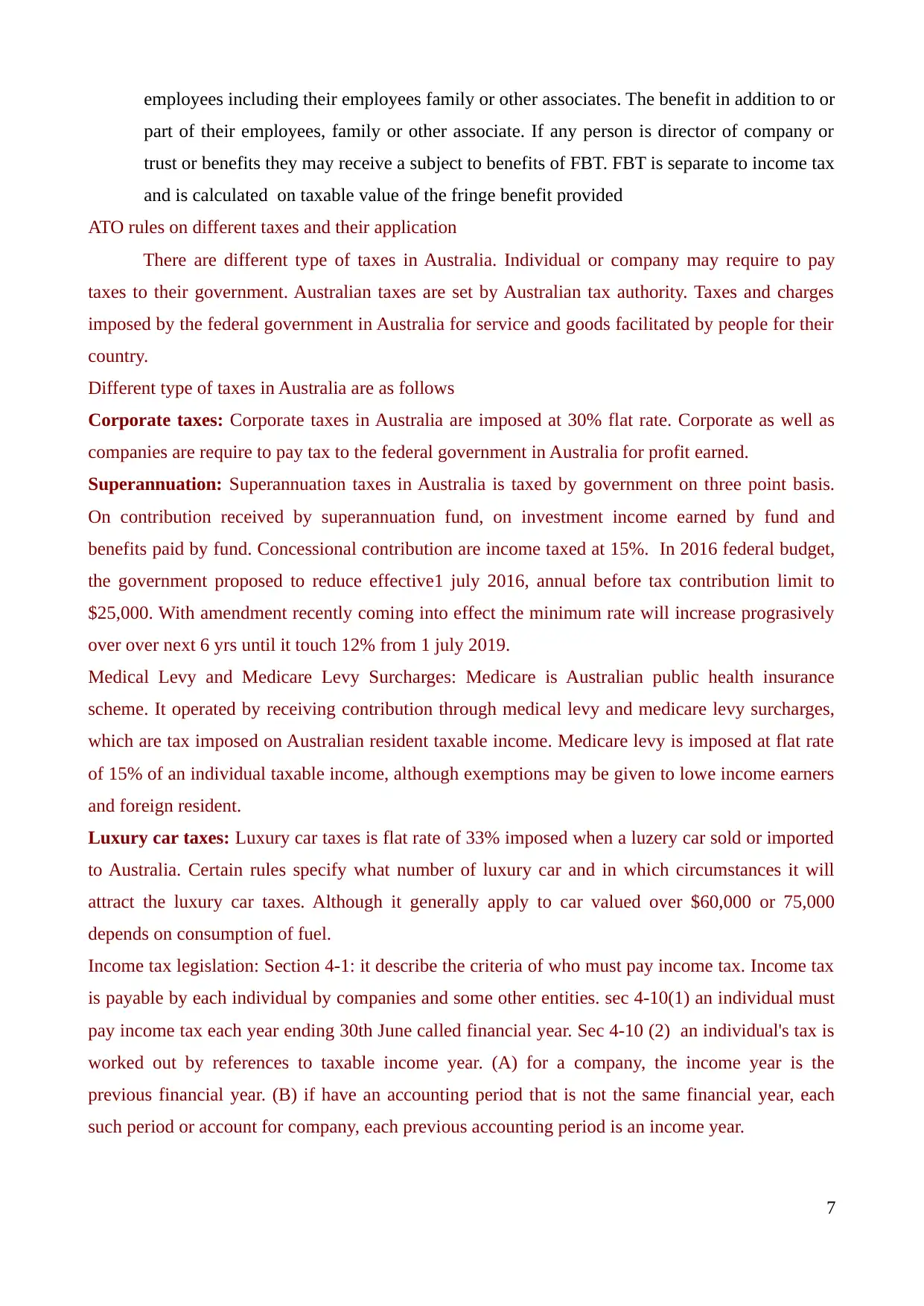
employees including their employees family or other associates. The benefit in addition to or
part of their employees, family or other associate. If any person is director of company or
trust or benefits they may receive a subject to benefits of FBT. FBT is separate to income tax
and is calculated on taxable value of the fringe benefit provided
ATO rules on different taxes and their application
There are different type of taxes in Australia. Individual or company may require to pay
taxes to their government. Australian taxes are set by Australian tax authority. Taxes and charges
imposed by the federal government in Australia for service and goods facilitated by people for their
country.
Different type of taxes in Australia are as follows
Corporate taxes: Corporate taxes in Australia are imposed at 30% flat rate. Corporate as well as
companies are require to pay tax to the federal government in Australia for profit earned.
Superannuation: Superannuation taxes in Australia is taxed by government on three point basis.
On contribution received by superannuation fund, on investment income earned by fund and
benefits paid by fund. Concessional contribution are income taxed at 15%. In 2016 federal budget,
the government proposed to reduce effective1 july 2016, annual before tax contribution limit to
$25,000. With amendment recently coming into effect the minimum rate will increase prograsively
over over next 6 yrs until it touch 12% from 1 july 2019.
Medical Levy and Medicare Levy Surcharges: Medicare is Australian public health insurance
scheme. It operated by receiving contribution through medical levy and medicare levy surcharges,
which are tax imposed on Australian resident taxable income. Medicare levy is imposed at flat rate
of 15% of an individual taxable income, although exemptions may be given to lowe income earners
and foreign resident.
Luxury car taxes: Luxury car taxes is flat rate of 33% imposed when a luzery car sold or imported
to Australia. Certain rules specify what number of luxury car and in which circumstances it will
attract the luxury car taxes. Although it generally apply to car valued over $60,000 or 75,000
depends on consumption of fuel.
Income tax legislation: Section 4-1: it describe the criteria of who must pay income tax. Income tax
is payable by each individual by companies and some other entities. sec 4-10(1) an individual must
pay income tax each year ending 30th June called financial year. Sec 4-10 (2) an individual's tax is
worked out by references to taxable income year. (A) for a company, the income year is the
previous financial year. (B) if have an accounting period that is not the same financial year, each
such period or account for company, each previous accounting period is an income year.
7
part of their employees, family or other associate. If any person is director of company or
trust or benefits they may receive a subject to benefits of FBT. FBT is separate to income tax
and is calculated on taxable value of the fringe benefit provided
ATO rules on different taxes and their application
There are different type of taxes in Australia. Individual or company may require to pay
taxes to their government. Australian taxes are set by Australian tax authority. Taxes and charges
imposed by the federal government in Australia for service and goods facilitated by people for their
country.
Different type of taxes in Australia are as follows
Corporate taxes: Corporate taxes in Australia are imposed at 30% flat rate. Corporate as well as
companies are require to pay tax to the federal government in Australia for profit earned.
Superannuation: Superannuation taxes in Australia is taxed by government on three point basis.
On contribution received by superannuation fund, on investment income earned by fund and
benefits paid by fund. Concessional contribution are income taxed at 15%. In 2016 federal budget,
the government proposed to reduce effective1 july 2016, annual before tax contribution limit to
$25,000. With amendment recently coming into effect the minimum rate will increase prograsively
over over next 6 yrs until it touch 12% from 1 july 2019.
Medical Levy and Medicare Levy Surcharges: Medicare is Australian public health insurance
scheme. It operated by receiving contribution through medical levy and medicare levy surcharges,
which are tax imposed on Australian resident taxable income. Medicare levy is imposed at flat rate
of 15% of an individual taxable income, although exemptions may be given to lowe income earners
and foreign resident.
Luxury car taxes: Luxury car taxes is flat rate of 33% imposed when a luzery car sold or imported
to Australia. Certain rules specify what number of luxury car and in which circumstances it will
attract the luxury car taxes. Although it generally apply to car valued over $60,000 or 75,000
depends on consumption of fuel.
Income tax legislation: Section 4-1: it describe the criteria of who must pay income tax. Income tax
is payable by each individual by companies and some other entities. sec 4-10(1) an individual must
pay income tax each year ending 30th June called financial year. Sec 4-10 (2) an individual's tax is
worked out by references to taxable income year. (A) for a company, the income year is the
previous financial year. (B) if have an accounting period that is not the same financial year, each
such period or account for company, each previous accounting period is an income year.
7
Paraphrase This Document
Need a fresh take? Get an instant paraphrase of this document with our AI Paraphraser
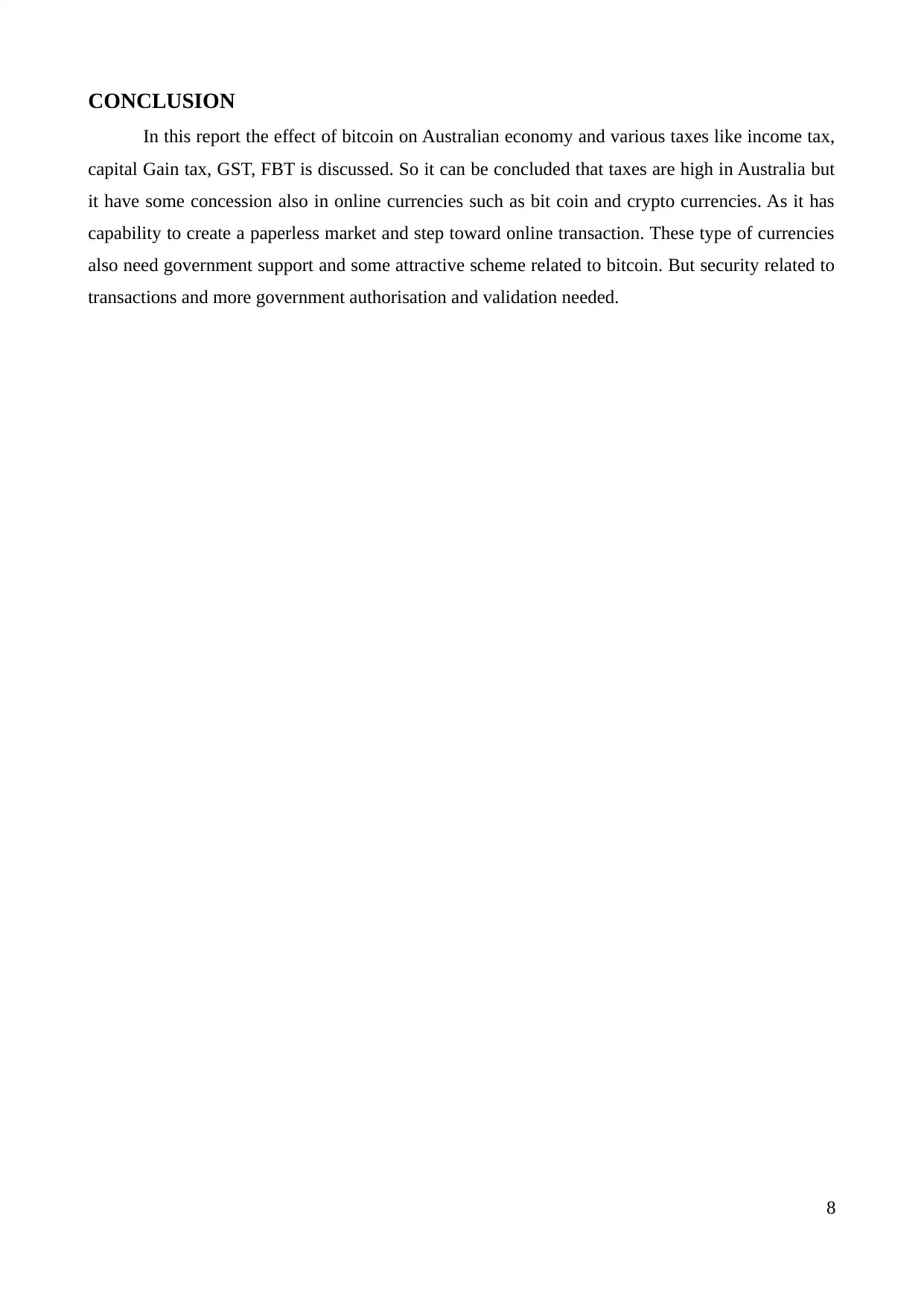
CONCLUSION
In this report the effect of bitcoin on Australian economy and various taxes like income tax,
capital Gain tax, GST, FBT is discussed. So it can be concluded that taxes are high in Australia but
it have some concession also in online currencies such as bit coin and crypto currencies. As it has
capability to create a paperless market and step toward online transaction. These type of currencies
also need government support and some attractive scheme related to bitcoin. But security related to
transactions and more government authorisation and validation needed.
8
In this report the effect of bitcoin on Australian economy and various taxes like income tax,
capital Gain tax, GST, FBT is discussed. So it can be concluded that taxes are high in Australia but
it have some concession also in online currencies such as bit coin and crypto currencies. As it has
capability to create a paperless market and step toward online transaction. These type of currencies
also need government support and some attractive scheme related to bitcoin. But security related to
transactions and more government authorisation and validation needed.
8
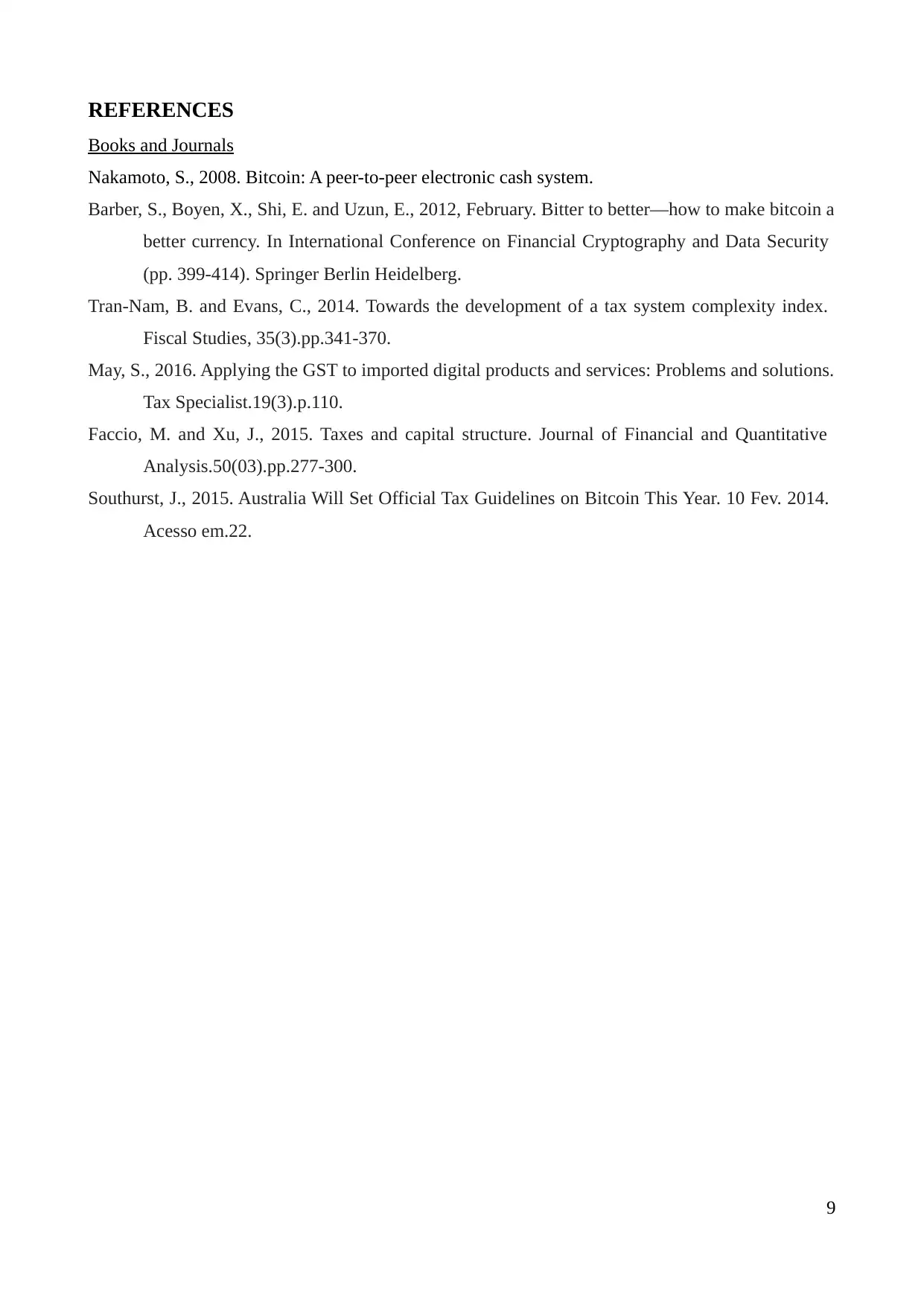
REFERENCES
Books and Journals
Nakamoto, S., 2008. Bitcoin: A peer-to-peer electronic cash system.
Barber, S., Boyen, X., Shi, E. and Uzun, E., 2012, February. Bitter to better—how to make bitcoin a
better currency. In International Conference on Financial Cryptography and Data Security
(pp. 399-414). Springer Berlin Heidelberg.
Tran‐Nam, B. and Evans, C., 2014. Towards the development of a tax system complexity index.
Fiscal Studies, 35(3).pp.341-370.
May, S., 2016. Applying the GST to imported digital products and services: Problems and solutions.
Tax Specialist.19(3).p.110.
Faccio, M. and Xu, J., 2015. Taxes and capital structure. Journal of Financial and Quantitative
Analysis.50(03).pp.277-300.
Southurst, J., 2015. Australia Will Set Official Tax Guidelines on Bitcoin This Year. 10 Fev. 2014.
Acesso em.22.
9
Books and Journals
Nakamoto, S., 2008. Bitcoin: A peer-to-peer electronic cash system.
Barber, S., Boyen, X., Shi, E. and Uzun, E., 2012, February. Bitter to better—how to make bitcoin a
better currency. In International Conference on Financial Cryptography and Data Security
(pp. 399-414). Springer Berlin Heidelberg.
Tran‐Nam, B. and Evans, C., 2014. Towards the development of a tax system complexity index.
Fiscal Studies, 35(3).pp.341-370.
May, S., 2016. Applying the GST to imported digital products and services: Problems and solutions.
Tax Specialist.19(3).p.110.
Faccio, M. and Xu, J., 2015. Taxes and capital structure. Journal of Financial and Quantitative
Analysis.50(03).pp.277-300.
Southurst, J., 2015. Australia Will Set Official Tax Guidelines on Bitcoin This Year. 10 Fev. 2014.
Acesso em.22.
9
⊘ This is a preview!⊘
Do you want full access?
Subscribe today to unlock all pages.

Trusted by 1+ million students worldwide
1 out of 9
Related Documents
Your All-in-One AI-Powered Toolkit for Academic Success.
+13062052269
info@desklib.com
Available 24*7 on WhatsApp / Email
![[object Object]](/_next/static/media/star-bottom.7253800d.svg)
Unlock your academic potential
Copyright © 2020–2026 A2Z Services. All Rights Reserved. Developed and managed by ZUCOL.





